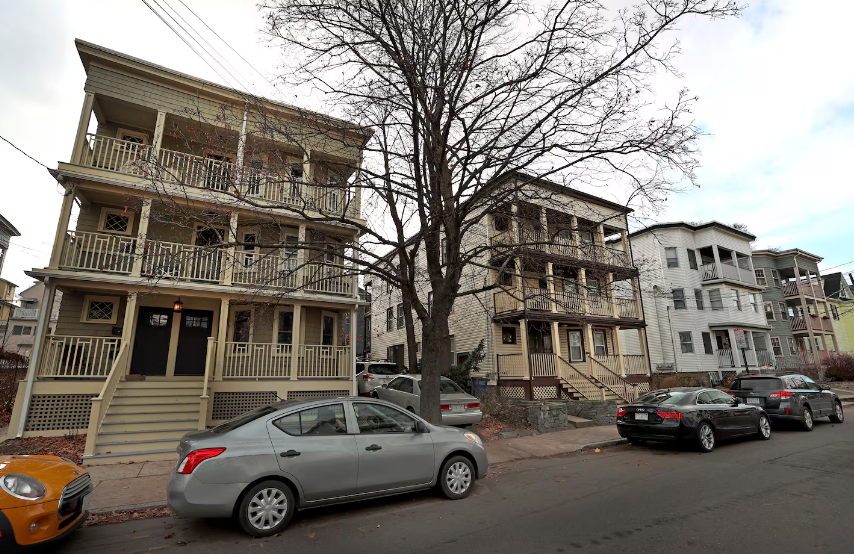Renters hate to pay broker fees. Will this change in Massachusetts?
Renters hate to pay broker fees. Will this change in Massachusetts?

Published by Lesley Palmiter
Renters hate to pay broker fees. Could this be the year those fees go away?
By Spencer Buell Globe Staff, Updated January 4, 2025, 6:00 a.m.
This is a long overdue conversation on tenancy in general, Massachusetts, in particular. It's a fraught situation with strong opinions on both sides about who should shoulder the cost of the action: the state or municipalities. Nevertheless, as a longtime advocate of affordable housing, I welcome it.
New York has already taken the plunge to make landlords responsible for paying the agents for facilitating their client's housing, not the tenants. There's an argument that it would raise the rent to cover the agent fee. However, as rentals are just as competitive as other housing, it's possible that landlords may insist on a lower fee for agents. Or that it might be negotiable.
Despite the possible upheaval it would cause, similar to new rules recently instituted to the purchase market, I see this a a positive change.
Read on.
Three-deckers on Albion Street in Somerville, a city where it is common for tenants to pay a broker fee before moving in.
Three-deckers on Albion Street in Somerville, a city where it is common for tenants to pay a broker fee before moving in. David L. Ryan/Globe Staff.
SOMERVILLE — Moving to one of the most expensive rental markets in the world requires sacrifice. Most of those who opt to settle around here understand they will pay handsomely for the privilege, trading a high sticker price for access to colleges, culture, walkability.
What they may not know, but learn quickly, is that here — and almost nowhere else — there can be another barrier to entry: Tenants are typically required to pay a fee to their landlord’s broker, usually a month’s rent, before they can move in. A bitter pill, and one they may need to swallow several times as they move from place to place.
“The rent here is already so high. The fact that we also have to pay a broker fee is just insane to me,” said Bryan Daley, 29, explaining he recently paid $3,200 to a broker he met only once, briefly, during a tour of a two-bedroom Somerville unit via FaceTime. “We’re not the ones who hire the broker, but we’re the ones who have to pay them.”
Among renters, the system is reviled, and a rite of passage in a tight market that gives enormous leverage to landlords.
Now, hoping to capitalize on the momentum from a New York City Council vote in November to prohibit tenant-paid fees, elected officials in Somerville, Cambridge, and Boston are mounting a newly invigorated effort to end the practice.
But unlike New York, where the city council was able to change the law on its own, communities in Massachusetts need approval from the Legislature for such a change, and Beacon Hill lawmakers have historically avoided tinkering with the status quo.
Supporters of allowing landlords to pass the fee on to tenants say that it helps ensure a smooth transfer of apartments, in line with tenant-focused laws on high-stakes measures like lead mitigation and fair housing, and that brokers in Greater Boston — where the job is known to be a grind — are fairly compensated.
Related: Renters are vexed by broker fees. Brokers say they earn their money. Skeptics also say freeing tenants from the burden of paying the fee would do little to bring down the cost of housing: After all, if landlords were forced to pay it, they could just raise rents accordingly.
But that’s a debate that should happen in Somerville, not on Beacon Hill, city officials say.
“It’s just infuriating to have to tell people who live in Somerville that our powers are really limited at the local level,” said Councilor Ben Ewen-Campen. “The real estate industry has a much easier time getting their way politically on Beacon Hill than they would in a city hall of a city where our constituents are facing this hellish housing crisis.”
Last year, the state Senate included a ban on tenant-paid broker fees in a major housing bill, but the measure wasn’t in the House version, and didn’t make it into the final one the governor signed in August. Some state representatives have said they would try again this year.
Other home rule petitions on renter policy have gone nowhere on Beacon Hill in recent years, including efforts by Somerville and Boston to bring back rent control. But this year, they hope the combined effort of those three cities — with perhaps more to follow — will put additional pressure on Beacon Hill. Boston, Cambridge, and Somerville alone account for 12 percent of the Massachusetts population, and are home to a significant portion of renters statewide.
“It makes absolutely no sense” that Somerville residents “should have to suffer” because the State House, not city officials, controls how apartments are rented, said City Councilor Willie Burnley Jr., himself a renter, who is helping lead the municipal charge.
There are many explanations for the lack of action on the issue at the State House, but local officials note the difference in housing status between the renting population and state lawmakers. A Globe report last year found there are more landlords than tenants in the Legislature, and at least 86 percent of state lawmakers own homes.
There are more landlords than tenants in the Massachusetts Legislature. Still, there is hope among some legislators that they can pass a statewide ban this year, which some argue would be preferable to having the rules set city by city, said Senator Will Brownsberger, who represents parts of renter-heavy Cambridge and Boston, but also Belmont, where most people own.
“I’m a strong believer that we need to have statewide policies — otherwise it creates confusion and complexity. That’s not in the interest of housing development and tenants broadly,” Brownsberger said.
He said other recent votes in the State House backing new eviction protections and access to free legal counsel for tenants showed “there’s a strong support for tenants in the Legislature.”
The virtual consensus in Somerville, meanwhile, is that ending forced broker fee payments is simply common sense.
Ask around.
“It just makes it that much harder for people to rent in an already incredibly expensive market,” said Matt Brunelle, a 31-year-old software engineer who now lives in Arlington and said he has paid five broker fees, north of $10,000 total, to move into apartments over the past decade.
“We didn’t even need to use a broker to find my current place,” said Tyler Harley, 32, who recently moved from Cambridge to East Boston, and said his landlord made him pay the fee anyway. “But you still have to pay what they ask you to.”
Average rents for a two-bedroom apartment in Somerville, Boston, and Cambridge are $3,000, $3,295, and $3,450, respectively, according to Zillow. That means moving from one apartment to another can require cash on hand of more than $13,000 — first month’s rent, last month’s rent, and a security deposit up front.
Still, banning tenant-paid broker fees could disrupt a real estate industry that has worked this way for many years, and perhaps not for the better, said Demetrios Salpoglou, chief executive of local real estate listing sites Boston Pads and Cambridge Pads.
He said renters tend to take for granted how much work a licensed broker does to make the process of finding and moving into an apartment go smoothly, be it arranging early-morning and late-night tours of units, or running background and credit checks while following state and federal law. A lot of what they do a smalltime landlord wouldn’t, or couldn’t, do properly on their own.
“Real estate agents work really, really hard for their commissions,“ he said. “There’s so much behind the scenes that the consumer doesn’t know.”
If landlords had to pay the fees themselves, Salpoglou said, they might opt to handle the transaction without a broker, creating new risks and headaches that prospective tenants would have to endure. Or they might start negotiating with brokers, and pay them a lot less.
Related: Micro-apartments will become a cost-effective solution for renters — eventually
It would turn what was once a relatively seamless, if expensive, process into chaos, he said, without meaningfully lowering the cost of housing.
“This is a distraction,” he said. “We have to start asking the right question. Which I think is, ‘How do we rapidly increase supply?”
The Greater Boston Real Estate Board, for its part, doesn’t support landlords forcing tenants to pay broker fees. “We believe that whoever brings the broker to the transaction should be responsible for paying the fee,” said Greg Vasil, its CEO.





